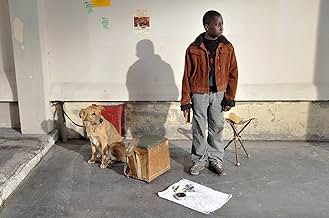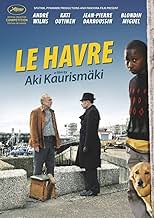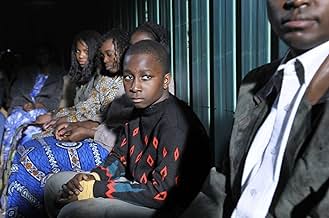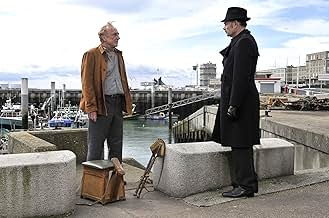CALIFICACIÓN DE IMDb
7.2/10
25 k
TU CALIFICACIÓN
Un joven africano llega al puerto de El Havre en un carguero. Un limpiador de zapatos entrado en años lo acoge en su hogar.Un joven africano llega al puerto de El Havre en un carguero. Un limpiador de zapatos entrado en años lo acoge en su hogar.Un joven africano llega al puerto de El Havre en un carguero. Un limpiador de zapatos entrado en años lo acoge en su hogar.
- Premios
- 15 premios ganados y 34 nominaciones en total
Quoc Dung Nguyen
- Chang
- (as Quoc-Dung Nguyen)
Little Bob
- Little Bob
- (as Roberto Piazza)
- Dirección
- Guionista
- Todo el elenco y el equipo
- Producción, taquilla y más en IMDbPro
Opiniones destacadas
This was one of the most visually stunning films I've ever seen. You could pause very nearly every shot and use it as screensaver or make a large print of it; that's how beautiful and well thought out they are.
Aki Kaurismäki evokes a sense of times past. He embraces the 'unreality' of his film, and the genre as a whole, and plays it up with great wit and art. As mentioned by previous reviews, he combines tragedy and comedy seamlessly into an extremely enjoyable and engaging film that doesn't try to pass itself off as life and as such engages on much deeper levels than its straightforward message or story would perhaps imply.
There are so many small details and well-thought out quirks here that keep your attention that it easily accommodates for my internet fried attention span, even while the director chooses not to openly deal with the electronic world. It's a decision indicative of the thoughtful and unique approach to the film; it aids both the storyline and the viewer's experience immensely. I was grateful and relieved to be taken away into a simpler and more honest world; both in the film's outward image, and within the story's universe. Its worth emphasising; this film doesn't try to masquerade as real life and as such allows for a much purer enjoyment. You don't have to worry about checking your expectations once the end credits roll.
Being beautifully shot may not have kept my attention for an hour and half, but the storyline and Kaurismäki's wit certainly did.
Aki Kaurismäki evokes a sense of times past. He embraces the 'unreality' of his film, and the genre as a whole, and plays it up with great wit and art. As mentioned by previous reviews, he combines tragedy and comedy seamlessly into an extremely enjoyable and engaging film that doesn't try to pass itself off as life and as such engages on much deeper levels than its straightforward message or story would perhaps imply.
There are so many small details and well-thought out quirks here that keep your attention that it easily accommodates for my internet fried attention span, even while the director chooses not to openly deal with the electronic world. It's a decision indicative of the thoughtful and unique approach to the film; it aids both the storyline and the viewer's experience immensely. I was grateful and relieved to be taken away into a simpler and more honest world; both in the film's outward image, and within the story's universe. Its worth emphasising; this film doesn't try to masquerade as real life and as such allows for a much purer enjoyment. You don't have to worry about checking your expectations once the end credits roll.
Being beautifully shot may not have kept my attention for an hour and half, but the storyline and Kaurismäki's wit certainly did.
The natural flowing of this simple movie, where no excesses are to be noticed ,may make one judge it as a weird movie, where something actually happens, but does seem to affect the lives of the characters. This is not properly true. Indeed, this is a simple movie, with no plot twists, no complications, but here does it lie its magic. It's a movie where "normal", common people simply accept their lives for what they are, which does not mean in a passive way, on the contrary they prove morally resilient people, who relate one another in an authentic way, behave as honest and fair people (so difficult to find people like these nowadays, that they look so strange!) they face bad things with dignity, and good things with no easy enthusiasm. Its best quality lies in the perfect and never clashing blend between hard facts (the hardships of immigrants, the theme of illness) and poetry, with a human faith in miracles which never sounds ridiculous or mystical: miracles happen simply because sometimes they may happen, and there's not even much to wonder at. There's such a placid attitude shown by the characters, very well interpreted by a good cast, that if the aim was to convey a calm and resilient acceptance of life, with its weird mixture of hardness and poetry, well, the aim has been successfully accomplished.
Like every fairy-tale, this film by Aki Kaurismaki is unbelievable, but this apparent fake doesn't hide a sad reality behind the good intentions of the simple people that help the illegal immigrant child to arrive finally to London, wherein we couldn't predict what kind of life waits for him. A slow rhythm, (some scenes seem like stills), and a brilliant and strong color that contribute to the atmosphere of unreality, the frustration to the normal expectations of the viewers that are carried to imagine the worst, and receive on the contrary the sudden impact of the best, don't prevent to bring to the conscience the images of the cruel world that surrounds the miracle of solidarity that saves, perhaps momentarily, just one of the hundred persecuted. The bad and the good boys are generally discovered by the camera, which leaves, significantly, in off the figure of the pitiless chief of policy, and introduces in darkness the figure of the denouncer. Le Havre is an optimist movie with a very dubious happy end.
This is a sweet, lightly intoxicating thing like a small glass of calvados under the wisteria in the evening. Kaurismaki has aged and his outcast and misfit characters aged with him, the quirks mellowed, the ferocious smoking toned down, the lines in the sometimes quietly astonished stone faces deeper, wearier, but imbued with almost ascetic serenity.
Some viewers have complained, why trivialize an actual problem in the manner of a fairy tale? A fair complaint for a problem perhaps more pressing than ever, especially in France and especially these days, with Sarkozi's desperate attempt to shore up votes for what looks like near-certain defeat in the upcoming elections by reverting to reactionary rhetorics from the far-right.
No, I believe the fairy-tale is the point. The idyllic neighborhood. The mannered caricatures of French people, with even the poorest having the time and fine sense of taste to leisurely enjoy their freshly baked baguette or glass of wine. The miraculous turn of events, explicitly acknowledged in the finale where kindness of this world is so overwhelming it even cures sickness. How could anyone miss this?
But a certain emptiness has always been of the essence for Kaurismaki, deliberate, designed emptiness.
The world is always flat to that effect, two-dimensional. The characters lack any conventional depth to speak of and do not really grow or learn lessons. By contrast, the plots of the films often exhibit a life of spontaneous motion, the objectives intentionally abstract, journeys across town, to America, in search of coffee and cigarettes. Motion for the sheer musical capacity of life to fill the quiet, the room in the heart to do so.
So it is always a variation of transient worlds centered in the stillness of the present moment that Kaurismaki has studied and consistently delivered. What is so remarkable is that he achieves this without any layering whatsoever, as a single flow.
This is his most Japanese film to date, even more concentrated flow than usual. Which is to say artificial nature that does not attempt to pass for the real thing but instead is empty space cultivated for beauty, a road-map for inner heart.
(I saw this together with the recent viral video KONY2012 and the contrast was amazing: that one, shameless artifice passing as nature, as truth, the real thing, contriving to motivate awareness several years after the fact and by selling merchandise, but was in truth both misinformed and morally dubious and even perhaps unwittingly manipulated agitprop in the service of shady foreign policy, while this one is simple, crisp, gracefully moral work, that does create awareness without any agendas.)
So it is very much the point that no one in the film is shown to wallow in misery, and most of the characters we meet would have plenty of reason to do so. Instead they enjoy this drink or meal together, whatever is at hand. And act with no complaint in the present moment to do what needs to be done. There is no meddlesome thought or proud ego to cloud the mind from the day's work, be it polishing shoes or helping out an immigrant kid.
This is the beauty of the thing: an idyll embedded with the purity of soul that gives rise to it and clear images only possible because of this cloudless eye.
The parting image is of a blossomed cherry tree gently rocking in the breeze, among the most traditionally Japanese images.
It encapsulates motion in stillness. The song of Zen.
Some viewers have complained, why trivialize an actual problem in the manner of a fairy tale? A fair complaint for a problem perhaps more pressing than ever, especially in France and especially these days, with Sarkozi's desperate attempt to shore up votes for what looks like near-certain defeat in the upcoming elections by reverting to reactionary rhetorics from the far-right.
No, I believe the fairy-tale is the point. The idyllic neighborhood. The mannered caricatures of French people, with even the poorest having the time and fine sense of taste to leisurely enjoy their freshly baked baguette or glass of wine. The miraculous turn of events, explicitly acknowledged in the finale where kindness of this world is so overwhelming it even cures sickness. How could anyone miss this?
But a certain emptiness has always been of the essence for Kaurismaki, deliberate, designed emptiness.
The world is always flat to that effect, two-dimensional. The characters lack any conventional depth to speak of and do not really grow or learn lessons. By contrast, the plots of the films often exhibit a life of spontaneous motion, the objectives intentionally abstract, journeys across town, to America, in search of coffee and cigarettes. Motion for the sheer musical capacity of life to fill the quiet, the room in the heart to do so.
So it is always a variation of transient worlds centered in the stillness of the present moment that Kaurismaki has studied and consistently delivered. What is so remarkable is that he achieves this without any layering whatsoever, as a single flow.
This is his most Japanese film to date, even more concentrated flow than usual. Which is to say artificial nature that does not attempt to pass for the real thing but instead is empty space cultivated for beauty, a road-map for inner heart.
(I saw this together with the recent viral video KONY2012 and the contrast was amazing: that one, shameless artifice passing as nature, as truth, the real thing, contriving to motivate awareness several years after the fact and by selling merchandise, but was in truth both misinformed and morally dubious and even perhaps unwittingly manipulated agitprop in the service of shady foreign policy, while this one is simple, crisp, gracefully moral work, that does create awareness without any agendas.)
So it is very much the point that no one in the film is shown to wallow in misery, and most of the characters we meet would have plenty of reason to do so. Instead they enjoy this drink or meal together, whatever is at hand. And act with no complaint in the present moment to do what needs to be done. There is no meddlesome thought or proud ego to cloud the mind from the day's work, be it polishing shoes or helping out an immigrant kid.
This is the beauty of the thing: an idyll embedded with the purity of soul that gives rise to it and clear images only possible because of this cloudless eye.
The parting image is of a blossomed cherry tree gently rocking in the breeze, among the most traditionally Japanese images.
It encapsulates motion in stillness. The song of Zen.
He's one of the directors (very few) there you recognize who's made the movie just after a couple of seconds. Kaurismäki has a tender view on shabby environments and shabby people. It has suited his Finland conception very well.
But it functions also in France and Le Havre, there you meet this shoe-polisher who tries to help a refugee boy. Not just the shoe-polisher, all working class people do.
It's a little miracle like every film in a sort of way is everywhere, but Kaurismäki takes it on without shame. And his environments and his tenderness seem to be universal. France is like Finland and the rest of the world.
But it functions also in France and Le Havre, there you meet this shoe-polisher who tries to help a refugee boy. Not just the shoe-polisher, all working class people do.
It's a little miracle like every film in a sort of way is everywhere, but Kaurismäki takes it on without shame. And his environments and his tenderness seem to be universal. France is like Finland and the rest of the world.
¿Sabías que…?
- TriviaThe character Marcel Marx, played by André Wilms, first appears in La vie de bohème (1992). Jean-Pierre Léaud also appears in both films, but as different characters.
- Citas
Marcel Marx: L'argent circule au crepuscule.
- ConexionesFeatured in At the Movies: Cannes Film Festival 2011 (2011)
- Bandas sonorasMatelot
Performed by The Renegades
Selecciones populares
Inicia sesión para calificar y agrega a la lista de videos para obtener recomendaciones personalizadas
- How long is Le Havre?Con tecnología de Alexa
Detalles
Taquilla
- Presupuesto
- EUR 3,850,000 (estimado)
- Total en EE. UU. y Canadá
- USD 611,709
- Fin de semana de estreno en EE. UU. y Canadá
- USD 26,363
- 23 oct 2011
- Total a nivel mundial
- USD 12,959,706
- Tiempo de ejecución1 hora 33 minutos
- Color
- Relación de aspecto
- 1.85 : 1
Contribuir a esta página
Sugiere una edición o agrega el contenido que falta





























